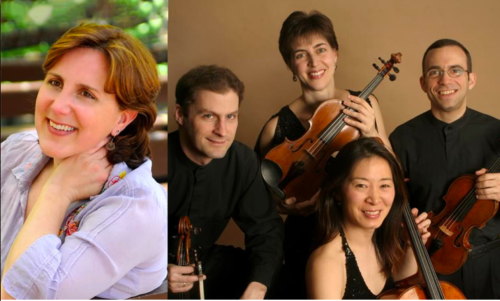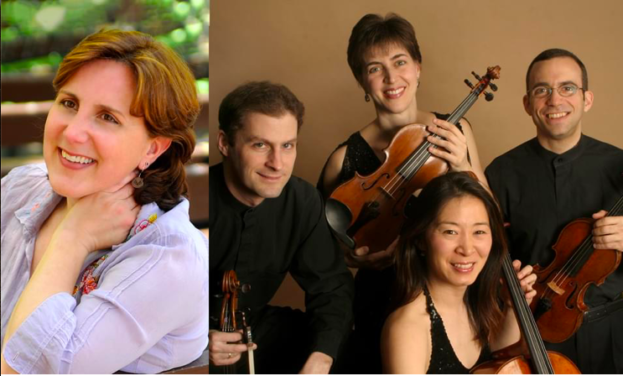 United States Various: Dawn Upshaw (soprano), Brentano Quartet / Serena Canon, Mark Steinberg (violins), Misha Amory (viola), Nina Lee (cello). Presented by San Francisco Performances, Herbst Theater, San Francisco, 12.1.2023. (HS)
United States Various: Dawn Upshaw (soprano), Brentano Quartet / Serena Canon, Mark Steinberg (violins), Misha Amory (viola), Nina Lee (cello). Presented by San Francisco Performances, Herbst Theater, San Francisco, 12.1.2023. (HS)

Purcell (arr. Mark Steinberg) – ‘Oh let me weep’ from The Fairy Queen; Fantasia No.5 for Four Viols in B-flat major; Fantasia No.7 for Four Viols in C minor; ‘When I am laid in earth’ (‘Dido’s Lament’) from Dido and Aeneas
Matthew Locke – Suite No.2 for Four Viols in D minor
John Dowland (arr. Stephen Prutsman) – ‘Come again, sweet love doth now invite’, ‘Can she excuse my wrongs’, ‘Weep you no more, sad fountains’
Thomas Tomkins – ‘Alman’
William Byrd – ‘Though Amaryllis dance in green’
Robert Johnson – ‘The Witty Wanton’
Melinda Wagner (composer), Stephanie Fleischmann (librettist) – Dido Reimagined: A Response to Purcell’s Lament
Dido dies at the end of Purcell’s Dido and Aeneas, but not before singing one of the great arias of late Renaissance/early Baroque opera, ‘When I am laid in earth’. It was violinist Mark Steinberg of the Brentano Quartet who suggested to soprano Dawn Upshaw that they get a contemporary composer and librettist to create an extended piece that lets Dido not only live but sing about it too.
The result, Dido Reimagined, pairs music by Melinda Wagner with words by Stephanie Fleischmann in what Steinberg’s program note defined as ‘something between monodrama and a song cycle.’ The piece debuted in 2022. Its West Coast premiere on Thursday at Herbst Hall began with songs, madrigals, arias and instrumental works from the same century as Purcell’s opera, and wrapped up with ‘When I am laid in earth’ just before intermission.
That first half offered music that echoed themes of the Dido story, but the wide range of actual melodies contrasted with the often laborious parlando of the new piece’s lines for the soprano.
The concert began with another Purcell aria, ‘Oh let me weep’ from The Fairy Queen. It made a great appetizer, its long lines foreshadowing similar aspects of the title aria that closed the first part. The string quartet interspersed fantasias, dances and instrumental arrangements by Steinberg of a few madrigals by Matthew Locke, Thomas Tomkins, and Robert Johnson with a series of vocal works by John Dowland and William Byrd.
Some of these made fascinating pairings. Purcell’s Fantasia No.5 for Four Viols in B-flat major led smoothly to the first movement (‘Fantazie’) of Locke’s Suite No.2 for Four Viols in D minor. The Dowland song that followed, ‘Come again, sweet love doth now invite’, had the sweet scent of the Locke piece.
The Courante from the suite came next, pairing with the same sort of lively feeling as Dowland’s ‘Can she excuse my wrongs’. Byrd’s ‘Though Amaryllis dance in green’ echoes the fun in ‘The Witty Wanton’ by Johnson, who wrote original scores for Shakespeare.
By the time we arrived at Purcell again, the simple glory of his writing and Upshaw’s clear, sweet lyric delivery made a satisfying finale. Upshaw and this quartet have a history of performing together, and their musical affinities were apparent.
The historical Dido really was a Phoenician queen. Her suicide as portrayed in Purcell, Virgil, Petrarch and Chaucer probably did not happen because of a ‘first’ love affair with Aeneas, since he wasn’t born until at least 40 years after her.
In Fleischmann’s libretto for Dido Reimagined, rather than take her own life the heroine chooses to isolate herself on an island, and she gets there somehow by car or bus. The words paint an evocative world in which she becomes increasingly one with nature. At the end, she ‘dissolves into the sea’, as the libretto has it. The final stanzas colorfully describe how all the elements of nature carry her spirit.
That should have been a strong narrative for a composer. With its softly dissonant textures and harmonies, Wagner’s music does a fine job of scene-painting, but what is missing is something to carry the libretto’s words into similarly arresting music for the soprano. The result comes off like a movie background score – very much in the moment, but these moments never quite coalesce into a musical statement.
Harvey Steiman

It would have been nice, to say the least, to have the words to the songs and the libretto for Dido Reimagined in or along with the program. I haven’t even been able to find them on the Internet.